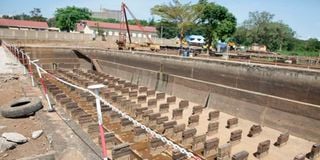State eyes billions in plan to upgrade ship repair industry

Kenya Shipyard’s ship assembly yard in Kisumu on May 29, 2021. KMA says Kenya loses at least Sh30bn annually to foreigners as the local boat and ship repair industry remains dormant.
The government plans to revitalise the boat and ship repair industry in Mombasa County which has been dormant leading to the loss of at least Sh300 billion annually to foreigners.
Through the Kenya Maritime Authority (KMA), the government is looking to recoup billions of shillings by making the port city a ship repair hub for the region.
KMA chairman Hamisi Mwaguya said the government has drawn a master plan to support the private sector in revamping the industry.
“Kenya spends billions of shillings on sea freight annually on foreign-owned vessels and that can be recouped by facilitating local shipping lines to dock in our port for minor repairs and service," he said.
Mr Mwaguya said the plan will be implemented through Public Private Partnership. This will create jobs, foster skill development, and attract international maritime business.
“We are not starting from scratch, we already have companies doing ship assembly and repairs, but not on a large scale. That is why we are talking to the private sector to partner with the government to revive the industry,” said Mr Mwaguya.
Mombasa has two private ship assembling and repair companies; African Marine and General Engineering Co Ltd and Southern Engineering Co. Ltd (Seco) which have been struggling to get business due to lack of favourable working conditions.
The companies have employed hundreds of people and assembled 10 small vessels for Uganda and Tanzania.
Mr Mwaguya said the industry has the capacity to create more job opportunities as the government implements a maritime strategic plan to empower locals through blue economy projects.
“As the Dongo Kundu Southern By-pass is being completed to facilitate easy crossing of people and vehicles without depending on ferries, we have a plan to rehabilitate the existing ferries and turn them into floating restaurants plying between Mombasa-Diani-Mtwapa for tourists, both domestic and foreign, to bring the much-needed income to the government,” said Mr Mwaguya.
He said that the government will facilitate implementation of various laws, including the cabotage law, which has been applied in other countries with coastlines to protect their domestic shipping industry and improve intra Africa trade which currently accounts for a paltry 17 percent, compared to 58 percent in Asia and 67 percent in Europe.
“The African Continental Free Trade Agreement (AfCFTA) envisions to boost intra-African trade by 52.3 percent by year 2025, increase Africa's income by up to $450 billion by 2035 and lift 30 million Africans out of extreme poverty. In the next few days, let's candidly discuss how the maritime sector will make the AfCTA dream a reality,” he said.
The government had earlier this year announced an ambitious plan to recruit 200,000 seafarers by 2027.





